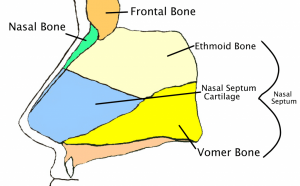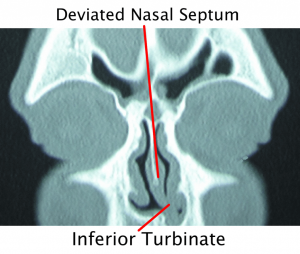Your path to breathing better begins here: Solve your deviated septum issue
If you live in Brooklyn and are struggling with nasal breathing, you may be experiencing symptoms of a deviated septum; a structural deviation in your nasal passages that can cause airflow obstruction and related problems. Dr. Mourad provides advanced treatment for nasal conditions, including highly skilled deviated septum surgery (septoplasty), to help you breathe with greater ease.
Relieve your breathing problems with septoplasty in Brooklyn – Meet with Dr. Mourad
Septoplasty Procedure to Improve the Nasal Passages
Septoplasty is a specialized surgical procedure that focuses on correcting deformities of the nasal septum to optimize breathing and nasal function. Performed as an outpatient treatment, the surgery involves modifying the cartilage and bone to restore proper alignment within the nose. This corrective approach not only improves the nasal structure but can also alleviate symptoms including obstruction, pain, and challenges with airflow, providing patients with better respiratory comfort.

How Can Dr. Mourad Improve my Quality of Life with Deviated Septum Surgery?
We often see patients from Brooklyn who have already used medications like nasal steroid sprays, decongestants or antihistamines, but still experience difficulty breathing. Our approach involves walking you through every possible treatment option so you understand your choices clearly. Our staff will handle insurance checks and manage the process wherever we can. With extensive expertise in all areas of nasal surgery, Dr. Mourad is committed to delivering the best care for your needs and is always open to discussing your treatment in detail.
Do I Need a Septoplasty?
The need for septoplasty is determined by whether a deviated septum is causing significant symptoms or affecting overall quality of life. Individuals may notice problems such as nasal obstruction, recurring sinus infections, nosebleeds, snoring, or signs of sleep apnea.
While medications, including nasal sprays, may help manage mild symptoms initially, surgical correction is generally advised for more serious cases. If you are experiencing any of these issues, arranging an appointment at our clinic in New York City for an assessment with a facial plastic and reconstructive surgeon can provide guidance and determine the most appropriate treatment plan.
Whether you need a septoplasty depends on whether you have a deviated septum that’s causing health issues or symptoms that significantly affect your quality of life: difficulty breathing through your nose, frequent sinus infections, nosebleeds, snoring, and sleep apnea.
The first treatment option is to manage deviated septum symptoms with medication such as nasal sprays, however septoplasty surgery is recommended for severe nasal symptoms. If you’re experiencing the following issues, it’s best to schedule a consultation at our clinic in NYC for an assessment by a facial plastic and reconstructive surgeon.

Common Symptoms of a Deviated Nasal Septum
Identifying the presence of a deviated septum relies on noticing signs such as difficulty breathing through the nose, ongoing facial pain, and frequent sinus infections. For individuals experiencing these symptoms, surgical intervention in the form of septoplasty may be necessary to correct structural irregularities in the nasal cartilage and bone, improving overall nasal function and comfort.
- Sleep Apnea and Other Sleeping Problems: Deviations in the septum can contribute to sleep-related breathing difficulties, including obstructive sleep apnea, which disrupts normal sleep cycles. Septoplasty may be recommended to improve airflow through the nasal passages, allowing for more restful sleep and reducing nighttime interruptions caused by restricted breathing.
- Chronic Nose Congestion or Nasal Obstruction: A deviated septum frequently causes persistent nasal blockage, making it hard to breathe freely through the nose. Surgical adjustment of the cartilage and bone can relieve these obstructions, improving airflow and providing lasting relief from congestion.
- Chronic Sinusitis and Sinus Infections: When the nasal septum is misaligned, sinus drainage can be compromised, leading to recurrent sinus infections. Septoplasty addresses the structural issues within the nasal cavity to enhance airflow and minimize the occurrence of sinus-related problems.
- Nasal Discharge (Runny Nose): An abnormal septum can contribute to chronic nasal discharge by affecting how air moves through the nasal passages. Corrective surgery can normalize airflow and reduce ongoing issues with a runny nose.
- Nasal Polyps: Soft, noncancerous growths called nasal polyps often occur alongside a deviated septum. These growths can block the nasal passages, impair the sense of smell, and promote infections. Surgical intervention may help restore normal function and reduce obstruction.
- Symptoms Similar to Allergies: Some signs that resemble allergic reactions, such as nasal congestion and frequent sneezing, can actually stem from a deviated septum rather than allergies. Accurate diagnosis is essential, and treatment may involve surgical correction to relieve symptoms and improve overall nasal health.
Why Choose Mourad NYC for Septoplasty Surgery in Brooklyn?
Choosing Mourad NYC for septoplasty surgery gives Brooklyn residents the benefit of working with surgeons who possess exceptional knowledge of nasal anatomy and highly developed surgical techniques. This trusted healthcare facility is dedicated to providing personalised care that addresses both the functional and aesthetic aspects of nasal health. Whether you need treatment for nasal obstruction, are experiencing the effects of a deviated septum, or are considering complementary procedures such as rhinoplasty, Mourad NYC uses advanced technology and a comprehensive, patient-focused approach. By entrusting your nasal care to Dr. Mourad’s extensive expertise, you are selecting a facial plastic surgeon committed to delivering the best outcomes and ensuring a comfortable recovery. Experience better breathing, an improved quality of life, and enhanced quality of sleep with septoplasty available to patients from Brooklyn.
Learn More About Deviated Septum Surgery at Mourad NYC
What is a Deviated Septum?
A deviated septum occurs when the nasal septum, composed of cartilage and bone that separates the nostrils within the nasal cavity, is not properly aligned. This misalignment may result from trauma, accidents, or natural developmental differences. People with a deviated septum often experience symptoms like persistent nasal obstruction, difficulty breathing, and the development of nasal polyps. Surgical interventions, including septoplasty or rhinoplasty, can reposition the septum, restore proper airflow, and improve overall nasal breathing and comfort.
Does Health Insurance Pay For This Type Of Nasal Surgery?
Most insurance providers generally cover functional nasal surgeries, which are procedures that focus on improving the performance and efficiency of the nose rather than purely aesthetic enhancements. When you visit our New York City office, our team will review your benefits in detail and let you know exactly what portion of the cost you would be responsible for if you undergo surgery to correct a deviated septum.
We aim to keep all patients in Brooklyn and the rest of our service area fully informed to avoid surprises regarding expenses. This includes providing clear explanations of co-pays, deductibles, and co-insurance amounts. We understand that managing healthcare costs is important and strive to make our services as affordable as possible. It is important to remember that purely cosmetic surgeries, such as cosmetic rhinoplasty, blepharoplasty, and other elective procedures, are not covered under insurance policies and would need to be handled separately.
What is the Cost of a Septoplasty Surgery in NYC?
On average, the price range for deviated septum surgery performed by a facial plastic surgeon in New York City is approximately $4,000 to $10,000. This range serves as a general guideline, and the final cost for septoplasty may differ depending on a number of variables specific to each patient.
When determining the expense associated with septoplasty, it is important to consider multiple components, such as the surgeon’s fee, the cost of anesthesia, charges for the operating room, and any post-operative care required. To receive an accurate estimate that is customized to your particular nasal needs, including the possibility of additional procedures like rhinoplasty, a consultation with a qualified facial plastic surgeon is strongly recommended.
What is the recovery time following septoplasty?
The length of recovery following septoplasty can vary among patients, but typically, most individuals are able to resume non-strenuous work or daily activities within one week of the procedure. Full internal healing, along with the resolution of swelling within the nasal passages, may require three to six months. During the early stages of recovery, patients should avoid activities that place stress on the nose, refrain from forceful nose blowing, and prevent any accidental trauma to the surgical site.
Are There Other Conditions That Can Block Your Nasal Airway?
Several nasal conditions in addition to a deviated septum, such as enlarged turbinates, chronic sinus infections, and nasal polyps, can obstruct the nasal passages and affect airflow. Understanding the potential advantages and limitations of surgical interventions like septoplasty is important to effectively manage these issues and improve overall nasal breathing.
What are potential risks of deviated septum surgery?
Choosing to have a septoplasty procedure involves recognizing that, like all surgical interventions, there are inherent risks and potential complications. Awareness of these factors allows patients to approach the surgery with realistic expectations and to prepare appropriately for the recovery process.
Nose Infection
Infections may develop either in the nasal cavity itself or at the surgical site, representing a possible post-operative complication. Strict adherence to care instructions, including taking any prescribed antibiotics, is vital to reduce the likelihood of infection and to promote effective recovery.
Septal Perforation
Although rare, septal perforation involves the creation of a hole in the nasal septum’s cartilage. This condition can negatively affect airflow and may require additional medical attention or surgical correction.
Prolonged or Intense Pain
Experiencing pain after septoplasty is normal, but some patients may encounter unusually long-lasting or severe discomfort. This can occur if there are complications such as tissue healing issues or the formation of a hematoma.
Facial Pain
Changes made to the cartilage or nasal bones during surgery may lead to varying degrees of facial pain. It is important to address any potential concerns about this type of discomfort during consultations to ensure patients are fully prepared.
Persistent Nasal Congestion
Temporary nasal congestion is common during recovery, but persistent or severe congestion may signal complications affecting the nasal passages or airflow. Monitoring symptoms and reporting them to your surgeon is essential.
Nasal Packing Complications
The use of nasal packing to control bleeding after surgery can be uncomfortable and may sometimes result in additional complications. Careful handling and proper removal of packing are important to prevent further problems.
Alterations to Nasal Structure
Surgical intervention can produce changes in the nose’s cartilage and bone, which can alter its overall structure. Discussing desired outcomes in detail with your surgeon prior to surgery is crucial to prevent unexpected modifications.

